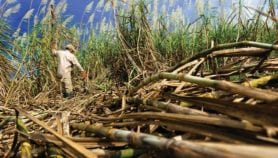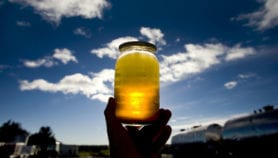By: Wagdy Sawahel
Send to a friend
The details you provide on this page will not be used to send unsolicited email, and will not be sold to a 3rd party. See privacy policy.
Hopes that algae could become a source of biodiesel that is friendly both to the environment and the poor may be premature, according to a review.
When early sources of biofuels — mostly derived from food crops — incurred widespread criticism for being harmful to the environment, undermining food security, and being unlikely to reduce overall carbon emissions, algae emerged as a potential biofuel source that could sidestep these problems.
But they have serious drawbacks that may mean they can never compete with other fuels, according to Gerhard Knothe, a research chemist with the US Department of Agriculture’s Agricultural Research Service.
"One aspect that has received little to no attention in the rush to develop fuels from algae is fuel properties," said Knothe. "Will the properties of fuels ultimately derived from algae be competitive with the properties of existing fuels or biofuels?
"Unfortunately, there are virtually no literature reports on the properties of algae-derived biodiesel."
When researching his paper, ‘Production and Properties of Biodiesel from Algal Oils’ which will be published by Springer in a book, currently in press, entitled Algae for Biofuels and Energy, he made "unexpected" findings, he said.
Knothe found that "many, if not most" of the biodiesel fuels derived from algae have "significant problems" when it comes to their ability to flow well at lower temperatures (‘cold flow’) and they also degrade more easily than other biofuels.
This is because many algal oils — from which the biodiesels are derived — contain relatively high amounts of saturated and polyunsaturated fatty acids.
Knothe said that researchers have been focusing on improving only the production of algae and fuels, but the need to investigate the fuel properties is now "urgent".
"The best production method may ultimately not accomplish much if the fuel is not competitive in terms of properties," he told SciDev.Net.
Luiz Pereira Ramos, chemist at the Federal University of Parana, Brazil, said Knothe was "absolutely correct. Most of the algae-derived biodiesel investigated to date are not suitable for fuel use."
The principal hope for overcoming the problem, both scientists said, is through genetic engineering of algae so they yield oils with more useful properties.
"However, this reality is still far away from anything practical," said Ramos.
But Steve Howell, president of the biodiesel consulting firm MARC-IV, and lead technical advisor for the National Biodiesel Board in the United States, said that genetic expertise is advancing fast and changes such as these are "infinitely more feasible than [they were] just a few years ago".













